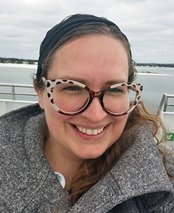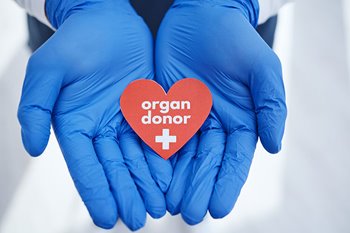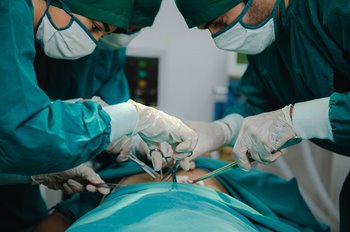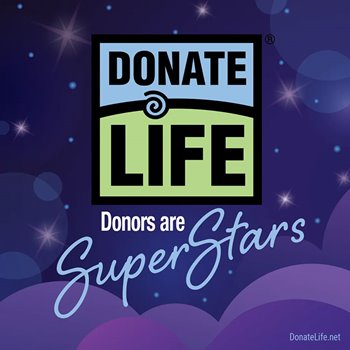 Jennalee Lundquist is one of the many organ donors in her family. One of at least 15.
Jennalee Lundquist is one of the many organ donors in her family. One of at least 15.
Jennalee is overjoyed to work with the incredible team at DCMC where she started as the Program Director of Senior Life Solutions just after Thanksgiving in 2023. Raised in Casco, and now residing in Kewaunee, she has two boys (Brady, 12 and Corbyn, 3).
Polycystic kidney disease runs in Jennalee's family. If one parent has the disease, their children have a 50 percent chance of contracting the disease.
Jennalee is one of the lucky ones that did not inherit this disorder in which clusters of cysts develop primarily within your kidneys, causing your kidneys to enlarge and lose function over time. The disease can cause serious complications, including high blood pressure and kidney failure.
Family Bonds Like No Other
Jennalee's family is large and, thankfully, close. Her father's cousin, Becky, was like a second mother to Jennalee growing up and so when Jennalee found out that Becky's kidneys were failing, she knew she wanted to be tested for a match right away. She was 23 years old, healthy, and organ donation was something she heard about often growing up in her family.
 In fact, the first kidney transplant in Jennalee's family happened in 1976 between her great-aunt, who had the disease, and her great-aunt's sister, who did not. (This sounds early, but the first successful kidney transplant happened in 1955.) Her great-aunt's kidney transplant lasted 27 years. The average expectation for a kidney transplant is now 20-25 years, but it wasn't then.
In fact, the first kidney transplant in Jennalee's family happened in 1976 between her great-aunt, who had the disease, and her great-aunt's sister, who did not. (This sounds early, but the first successful kidney transplant happened in 1955.) Her great-aunt's kidney transplant lasted 27 years. The average expectation for a kidney transplant is now 20-25 years, but it wasn't then.
As far as Jennalee is aware, since 1976, there have been at least sixteen kidney donations within her family due to polycystic kidney disease, with a vast majority of the donors being another family member. While researching the family kidney donation lineage, Jennalee realized that the person that was documenting the history of PKD and transplants in the family is no longer living, and the last recorded transplant was in 2007. Jennalee and Becky's transplant took place in 2012, meaning there are most likely many more transplants that have not been recorded. Jennalee is planning on doing some research, and continuing where her great-aunt left off in her recording of family transplant history.
A Not So Big Decision
By 2010, Becky's condition was at the point of her needing a life saving kidney transplant.
"It was an easy decision to get tested to see if I was a match," says Jennalee.
The first step is to complete a blood test to determine compatibility. Once the blood test matches, the testing process for kidney donation is extensive. It includes a complete physical examination, immunological testing, EKG, 24 hour urine testing, chest X-rays, psychiatric consultation, consultation with a dietician, among many other meetings and testing needed.
According to the National Kidney Foundation, "The evaluation process is meant to protect you. It ensures that you are healthy enough to donate a kidney…If at any point in the evaluation process you decide that you do not want to donate your kidney, your living donor transplant team can help you decline in a way that preserves the family relationships."
"Once we discovered I was a match, there was more testing over the course of about 4 months. At one point, they drew what seemed like fifteen vials of blood," recounts Jennalee, "I had to do a 24-hour urine collection, meet with a dietician, an advocate, and a psychiatrist who evaluates whether you are doing this out of your own free will. Then I actually had to get approved by a board. I didn't really even have the final say. It was the committee at that hospital that made the final decision."
All Clear, and Then Not
Jennalee passed all the tests, "I was excited but, I have to admit I was also nervous. It's a big surgery! But I was thankful that I was going to be able to do this for her. She's a very special person to me."
Becky, her five children and the entire family were overjoyed.
Then, Jennalee found out she was pregnant. Everything had to be put on hold. Jennalee felt horribly guilty for the delay in the transplant, but Becky handled everything with grace and utmost support which just reinforced Jenalee's desire to make sure Becky got the kidney she needed. She gave birth to a healthy baby boy, Brady, via c-section in September of 2011.
Moving Ahead, Finally
By June of 2012, Jenalee was all clear for the procedure. Her parents, partner and her new, 9-month old baby accompanied her to Madison.
 They had Becky and Jenalee prepped for the surgery at the same time. According to the surgeons, they were both under anesthesia and "open" at the same time so the kidney could go from one person to the other as quickly as possible. They removed Becky's kidneys first and then used Jennalee's c-section scar to reach her kidney.
They had Becky and Jenalee prepped for the surgery at the same time. According to the surgeons, they were both under anesthesia and "open" at the same time so the kidney could go from one person to the other as quickly as possible. They removed Becky's kidneys first and then used Jennalee's c-section scar to reach her kidney.
The surgeries were successful. Becky is still doing great 12 years later.
Becky summed up the experience on Jennalee's social media page recently stating, "People take life for granted. I know I did too, but when you get sick and other people are there for you like Jennalee, you think twice about what you have and who your friends and family are, and be grateful for your life because you don't always have that second chance. So I thank God every morning for what Jennalee has given me. She has the biggest heart and if not for her, I definitely would not be here today. Thank you for the gift of life Jennalee."
Recovery
Jennalee's recovery was about 6 months long, and with a toddler to chase, it wasn't easy, "I couldn't pick him up or carry him, but I wouldn't have it any other way."
"Now, I can't even tell that I only have one kidney. The only thing I have to really worry about is taking medications that might be processed through my kidneys," Jennalee gets her remaining kidney checked out annually.
She plans to document all the kidney donations in her family some day, "After my surgery, I went to visit my great aunt - the first one in our family to donate her kidney. She was also a nurse. She was jealous that my scar was so small compared to hers," Jennalee recalls fondly, "She lived into her late 80s so I think that is a pretty good sign that I do not have to worry."
April is Donate Life Month
 National Donate Life Month (NDLM) was established by Donate Life America. Observed in April each year, National Donate Life Month helps raise awareness about organ, eye and tissue donation, encourage Americans to register as donors and to honor those that have saved lives through the gift of donation.
National Donate Life Month (NDLM) was established by Donate Life America. Observed in April each year, National Donate Life Month helps raise awareness about organ, eye and tissue donation, encourage Americans to register as donors and to honor those that have saved lives through the gift of donation.
In honor of Donate Life Month, DCMC is celebrating with a flag raising ceremony starting at 1pm where Jennalee will be sharing her story at exactly 1:08 p.m. on April 10th, 2024 at the main entrance of Door County Medical Center Sturgeon Bay campus. The event is free and open to the public. Everyone is encouraged to wear blue and green in honor of Donate Life Month.
Become a Donor
Jennalee says, "If you are thinking about being a living donor, I would recommend at least starting the process. You learn so much. It's not like you say you're going to do it and then you have to commit at that exact second. You can change your mind at any time in the process and everyone is very supportive. So if you're really thinking about it, I would just start the process. To me it's been completely worth it. It's worth it to see the effect my gift has had on Becky and how much better it has made her life. That alone makes my life better."
Are you interested in becoming an organ, eye or tissue donor? Learn more at www.donatelife.net.